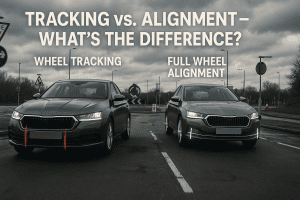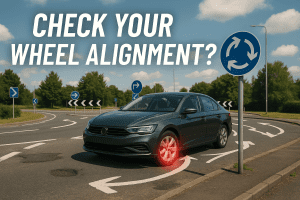That Sinking Feeling: When Your Car Decides to Quit at the Worst Possible Moment
THUNK. Whirrrr. Silence.
We all know that stomach-dropping moment. You’re crawling through morning traffic, you’re already running late, and suddenly your trusty vehicle decides today’s the day to give up. Usually at a roundabout. Usually in the rain. Usually when you can least afford the time or money to deal with it.
Sound familiar? If you drive in Milton Keynes, chances are you’ve either experienced this nightmare scenario or you’re unwittingly on your way to it.
Just ask Dave, who learned this lesson at 8:15 am on a Monday morning, stranded on the Shenley roundabout with smoke pouring from under his bonnet. “I’d been ignoring that temperature warning light for weeks,” he admits sheepishly. “Thought I could get away with it until payday. Ended up costing me three times more in repairs and a day’s wages.”
The truth? Most of these car disasters aren’t random acts of automotive cruelty. They’re the predictable result of neglecting the basics. And in our roundabout-packed city, your car faces challenges that drivers in other towns simply don’t encounter.
Why Milton Keynes Is Basically a Car Torture Test
If you designed a city specifically to put vehicles under stress, it would look suspiciously like Milton Keynes. Our beloved grid system with its 130+ roundabouts isn’t just a navigational quirk – it’s a mechanical endurance course.
Every day, your car endures:
- Constant brake-accelerate cycles that wear pads and discs faster
- Endless gear changes between first and second that punish your clutch
- More steering inputs in one commute than some cars face in a week
- Rapid speed changes that stress your engine and transmission
Then factor in our delightful weather, from torrential downpours that flood our grid roads to winter ice that turns roundabouts into skating rinks, and you’ve got perfect conditions for vehicular rebellion.
“But my car seems fine!” I hear you say. Here’s the scary part: most catastrophic failures don’t happen suddenly. They give warnings, subtle at first, then increasingly desperate until finally, they give up entirely. Usually when you’re already having a terrible day.
Your ‘Keep-My-Car-Alive’ Checklist for Milton Keynes Driving
Here’s what your car wishes it could tell you. Consider this its desperate plea for attention before it decides to strand you at the Kingston roundabout during rush hour:
Weekly Quick Checks (Takes literally 5 minutes)
- Dashboard Warning Lights – They’re not decorative Christmas lights! If one stays on, it’s your car’s version of sending up a flare. Especially check after starting on cold mornings.
- Listen for New Noises – That new squeal when braking? The grinding when turning? That’s your car screaming “HELP ME!” in the only language it knows.
- Tyre Kick – Not just for car dealers. A quick visual check catches bulges, nails, and dangerous wear before they cause a blowout on the A5.
Monthly Must-Dos (15 minutes that save thousands)
- Tyre Pressure & Tread – Under-inflated tyres aren’t just fuel-wasters; they’re dangerous on wet roundabouts. And with MK’s frequently rainy conditions, you need every bit of tread you can get. The 20p test takes seconds: if you can see the outer band of the coin when inserted in the tread, your tyres are too worn.
- All Fluid Levels – Engine oil, coolant, brake fluid, power steering, screen wash. Low levels don’t politely warn you – they catastrophically fail. Check them cold, on level ground.
- Lights Check – With poorly lit grid roads and early winter sunsets, functioning lights aren’t just legal requirements they’re survival tools. Get a friend to help check brake lights or use reflections in shop windows.
- Windscreen & Wipers – That tiny chip from a stone? Winter freeze-thaw cycles will turn it into a crack faster than you can say “failed MOT.” And wipers that streak aren’t just annoying they’re downright dangerous when you’re trying to navigate the Denbigh roundabout in a downpour.
Quarterly Checks (That Prevent Quarterly Crises)
- Battery Terminals – Corroded terminals cause more non-start misery than almost anything else. They should be clean, tight, and corrosion-free. Most Milton Keynes journeys are short hops between districts, which ironically is the worst type of driving for battery health.
- Braking System – If stopping feels more like a suggestion than a command, get it checked immediately. With our stop-start roundabout traffic, Milton Keynes drivers replace brake pads up to 20% more frequently than the UK average.
- Suspension – If your car handles speed bumps like a bouncy castle, your suspension cries for help. Good suspension isn’t just about comfort; it’s about control, especially on wet roundabouts where grip is already compromised.
- Belt Inspection – Mysterious squealing when starting or accelerating? Often it’s a belt warning you of impending doom. Check for cracks, glazing, and proper tension.
Annual Non-Negotiables
- Timing Belt – If your car’s manual mentions this, burning the reminder into your brain. When timing belts fail, engines often follow – resulting in repair bills that make your eyes water.
- Exhaust System – Road salt from winter accelerates corrosion. Listen for new or changing exhaust notes your car shouldn’t sound like it’s auditioning for Download Festival.
- Wheel Alignment – After winter’s pothole season (which seems to last 11 months in MK), this prevents uneven tyre wear and improves fuel economy. If your car pulls to one side, you’re already overdue.
- Filters – Fuel and air filters are the unsung heroes of engine efficiency. They’re relatively cheap to replace but expensive to ignore, especially if you mainly do short trips across Milton Keynes.
Real Talk: The Cost of Cutting Corners
Emma’s story might sound familiar. “I kept putting off my service because of the cost,” she tells us. “Then my car broke down on the way to an important job interview. The repair bill was five times what the service would have cost, and I didn’t get the job. Most expensive money-saving decision I’ve ever made.”
Meanwhile, Alex has a different approach. “I spend about £300 a year on preventative maintenance,” he says. “Haven’t had an unexpected breakdown in seven years. When you consider the cost of emergency repairs, recovery services, missed work, and the sheer stress of breaking down, it’s the best investment I make.”
The Milton Keynes Car-Killer: Why Our Roads Are Different
Our city’s unique grid layout creates driving patterns you simply won’t find elsewhere:
- Roundabout Ravages – The average Milton Keynes commute involves navigating more roundabouts in one journey than many UK drivers face in a week. Each one means braking, accelerating, turning, and changing gears – all of which cause wear.
- Short-Trip Syndrome – Many MK journeys are short hops between districts, which means your engine rarely reaches optimal temperature. This leads to increased engine deposits, oil contamination, and battery drain.
- Weather Whiplash – From flooded underpasses to scorching summer traffic jams, our local weather conditions put additional strain on cooling systems, wipers, tyres, and virtually every component.
And let’s not forget some roundabouts are more notorious than others. The “most ignored” roundabout at Overage and Childs Way junction has seen multiple accidents, while others cause confusion with their unique lane markings. Driving these daily accelerates wear and tear dramatically.
Your Car Is Talking – Are You Listening?
Cars rarely fail without warning. The problem is, most of us aren’t listening to the warning signs:
- That slightly longer cranking before the engine starts
- The momentary hesitation when accelerating
- The subtle pull to one side when braking
- The occasional whiff of something burning
These aren’t normal. They’re your vehicle’s increasingly desperate attempts to communicate before things go catastrophically wrong – usually at the worst possible moment.
Don’t Be Dave, Be Alex – Book Your Check Today!
At MK12 Autocare, we’ve seen it all from brake failures at busy junctions to engines destroyed by neglected oil changes. Our team of local experts understands exactly how Milton Keynes driving impacts your vehicle.
We don’t just fix problems we prevent them. And we won’t baffle you with jargon or recommend unnecessary work (we hate that as much as you do).






